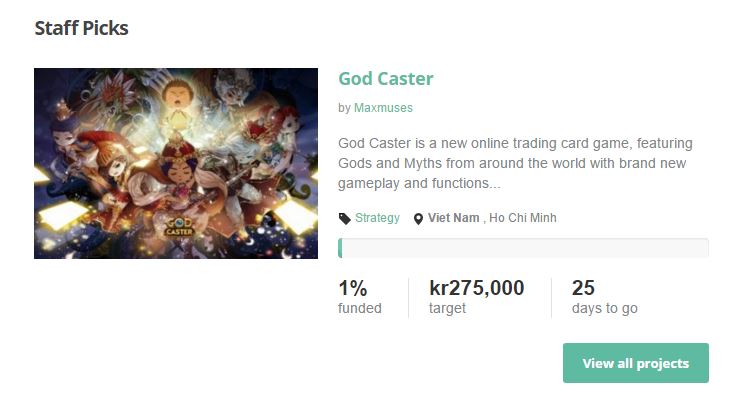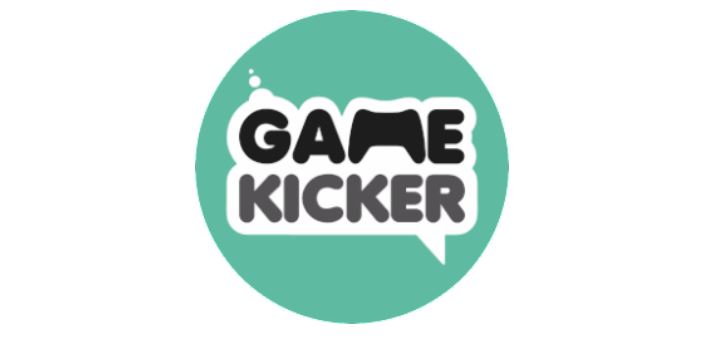We live in an age where video game crowdfunding is not only accepted, it is often expected. Many indie developers now consider hitting up the popular options – Kickstarter or Indiegogo – both as a means to draw attention and receive much-needed development funding. Of course, fans of crowdfunding are likely to know there are many other sites beyond these two which an aspiring game dev might look toward for help. Now there is another new site out and this one states that it caters to video games specifically: Gamekicker.
They claim this is the first crowdfunding site that “will only accept projects from independent developers,” but that’s not the case. Fig was also designed with such a goal in mind. Of course, many have since soured on the Fig concept given that it seems their main focus is on promoting titles which are directly related to the board of directors themselves. With that said, they are still showcasing independently-produced projects, even if they don’t feel particularly “indie” anymore. With that bit out of the way, it seems like there may be room for something like Gamekicker to flourish. Unfortunately, they have already made a few key mistakes which need to be remedied to keep the site around in the long run.

Let’s start with a fairly small, but important, issue. Gamekicker is currently running campaigns for two projects: Cure and God Caster. Cure needs $75,000 in funding to succeed while God Caster requires approximately $33,000. The problem here is not with either of these two games. On the contrary, they both are pretty neat looking! The issue is that I actually had no idea how much God Caster was asking for before visiting the project page because everything else lists its goal as kr275,000. Only after looking at the fairly small grey text on the page did I realize its got a $33k goal. Now, people aren’t stupid, and can easily read the small text. However, why isn’t it the case that the USD value isn’t put first and foremost instead? Despite appearing like a cooler project (in my opinion) than Cure, it has far less support.
It is my belief that, for the most part, people tend to back projects more when they have a general understanding of the cost (overall funding goal and reward tier). Although not an official rule, initiatives such as Square Enix Collective suggest that developers launch their projects with a USD goal. Kickstarter ensures that US customers can see any project’s USD goal immediately (and see original currency values by hovering). Gamekicker really should implement a similar solution, or at least swap where the two values are displayed, to make it more apparent right from the get go. Similarly, they should also add something which shows the number of backers per project. As of now, you can’t even see a tally of how many people backed an entire project, let alone how many have selected a certain tier. Right now you can only click the backer tab to see a list and count them up yourself.

Things like this are easily fixable, and may have just not come to mind for Gamekicker’s staff. Unfortunately, there are larger issues in the way which may restrict its growth potential to a deadly degree. The key issue falls with their distinctive feature of “personal coaching before, during, and after the campaign.” Now, this is fabulous in theory. Provided the staff has a deep knowledge of crowdfunding (both externally and internally) this is something neither Kickstarter or Indiegogo currently offer to everyone. Kickstarter is even often willing to leave massively popular projects to fend for themselves after being funded.
With that said, think about this for a minute. Every single project that makes its way onto Gamekicker will receive a personal advisor to help them out. That’s fine when there’s only two projects on the site, as maybe one person could honestly manage both (though one advisor per project would be the ideal situation). However, how is the site expected to grow if it needs to continue to offer this to each and every campaign? It’s true that Gamekicker will screen each project and only let certain ones through, but at some point a healthy crowdfunding platform is expected to have a fair number of projects going at one time. Fig is really the outlier here, and even they have gone against their original tenant of only showcasing one project at a time. Unlike Fig, Gamekicker would need to support a good handful of projects at a time because the 5% return on successful ones isn’t nearly as vast as the sums Fig (the platform) will see on its singular, humongous projects.

It simply won’t be feasible for even a small team of staff members to juggle many Gamekicker projects at once. And if the support is lessened or removed entirely, then this destroys one of the most exciting aspects of Gamekicker. Crowdfunding is in need of more support for successful teams because it is often a lack of guidance which results in the same issues happening time and time again (overzealous stretch goals, lack of contact with backers, massive underestimation of shipping costs, etc). However, this potentially great aspect of the site is a double edged sword and one that might bite Gamekicker if it does manage to see success.
Of course, as of now it doesn’t seem like Gamekicker will even have the chance to experience these problems. Despite launching in early March, very few gamers are even aware of its existence. No large gaming sites have covered the platform, and it seems that only a few sites covered God Caster. Crowdfunding (for any medium) lives or dies on getting projects in front of as many people as possible. This key aspect is simply not being met by Gamekicker. While they did manage to nab some sweet games for launch, unless they draw far more attention to themselves soon, they will fail. With grand ideals but failures under its belt, less indie developers will be willing to even give it a shot to begin with. Why waste time on a site you’re likely to fail on when you can at least get coverage (if nothing else) by launching a decent Kickstarter campaign?
As of now it appears that Gamekicker is doomed on both ends of the spectrum. If it attains success, it will need to seriously modify its key tenants in order to grow. However, as of this moment it seems unlikely to gain attention because nobody is willing to give it a look during this launch period. That may change, but if things don’t turn around soon then they may not even be given a second chance. Take a look at Gamekicker for yourself and judge whether it seems more promising or distressing and let us know your thoughts in the comments.




The layout looks way too much like Kickstarter to me.
As much as I dislike somethings about FIG, what Fig did get right at launch and moving foward, was that they had brand name association with their campaigns (dev’s or franchises). So it’s much easier to launch and gain momentum when people are taking about your site and campaigns, in that regard Fig is more relevant than Gamekicker.
Well, i know what i hate about FIG. The economic system and their simplistic explanation about it. Besides when you try to become an investor you realized that even that side is badly done, with too much restriction (even more if you’re not from the U.S). You can add the fact that it is linked to several people that use it for their own promotion and that after using the crowdfunding system for themselves thought “why not use my name and take a piece of the pie”.
Still the whole idea behind FIG/GameKicker, is, restricting creativity (by endorsing just one project). which goes against the whole idea of the indie world (be open-minded, be creative and original).
FIG for me is like a private party between friends in a known dancing floor where you can’t enter because you’re not on the list. KS is like a rave. Gamekicker is like a party friend at your place (where no one comes than your friends..).
Bravo on the complaints with FIG! On the Gamekicker/Fig only releasing few projects, I don’t necessarily see that as a bad thing. If both sites released one project a week, and spread awareness of the project, I could see that as a viable business model.
Yes, but, it’s not the case. it’s even the whole point about it. One project at a time or almost. True that if it were one project every week it would be better off.
I am not saying it is a bad thing. Just that is goes against the idea of what being indie is and the way it is handled is wrong. Opening their doors to everything like kickstarter isn’t a good thing either.
If i were to give you my personal opinion of “what” should be done.
I’d take you the example of GoG with the “in-dev” model.
They are carefully choosing the project accepted in it.
It’s at a one by week/accepted project ratio atm. But it might slow down to get to one by month i think. but it’s not like steam where everything can goes through it, still they were open minded enough to created an early system (GoG) like steam. But they’re “really” managing it.
That’s how you should conduct business. Still what i would like to see as a model on a crowdfunding platform would be one launch by journalists with network at IGN/PC gamer etc on the board.
Thing that would ensure a “real” coverage to the project. Or a model, that at the end of the project failure or not would ask you if you want your money to still go to the dev or not (with a simple rhetoric yes/no question asked twice). Same idea for the investors and failed project, your money could still go to the dev if you decide with an entitled share on the project if it were ever to be released.
Stuff like that. I could go on with this. To be short, there is no good platform atm. But FIG is the one that irks me the most.
[…] which comes through their doors. All of this sounds fantastic, but unattainable. I discussed this new platform last month when it just opened its gates. My perspective was that this initiative was very “pie in the […]
[…] work. Fig and other start-up game focused crowdfunding sites haven’t yet proven their viability, and usually fail within a year. That’s just counting video game related sites, crowdfunding desperately needs a […]